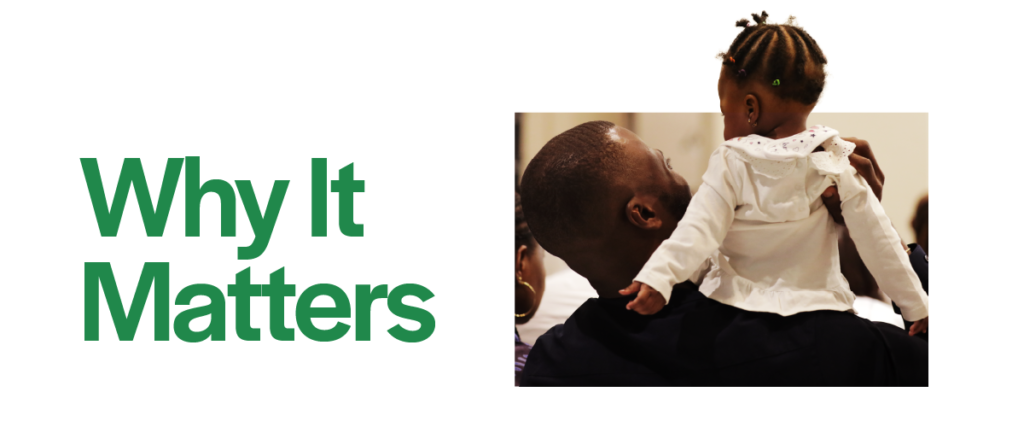
In this Question & Answer session, we sat with Chidinma Abiakalam, a Childhood Consultant and Mental Health Worker, whose counselling has helped many parents rediscover the joys of relationships with their children. She does this by providing insights and support from her experience and Christian faith that help in building healthy relationships and mending broken ones.
What does a healthy relationship with a child look like?
When people ask me similar questions, like, ‘Should my child be my friend?’, I always say ‘It’s contextual’, for example, if it is in the general sense of friendship where you share common experiences with or confide in someone yet without disciplining the person, then ‘No, your child cannot be your friend,’ until a particular stage of life. For example, a grown lady can be her parents’ friend because she is no longer in that space where she is scolded by her parents.
However, a healthy parent-child relationship is one where your child has access, confides in, asks for guidance, direction, comfort, and even laughs with you. A healthy relationship is more than friendship but not less of it. A healthy relationship has what is called ‘psychological safety’, a workplace term that can be used in the family space because the family is the first team ever. As in a workplace, a team can be healthy or unhealthy, functional or dysfunctional. It is about the people in the team and the things they do. When a family is psychologically safe, the child(ren) has the freedom to be themselves, air their views, share their ideas., and make mistakes without the fear of being punished, ridiculed and discriminated against. That’s a healthy relationship.
Also, in parenting, discipline is not something to be avoided but is crucial in the development of a child. Bear in mind that discipline is not always punitive, connoting pain and suffering. Discipline aims to redirect, grow and teach the child. There is a quote I love from the Biblical Foundation for Child Training, a non-profit ministry that provides Biblical Training for Christian leaders and parents:
“Love without discipline produces spoiled children. Discipline without love produces discouragement and rebellion. Teaching and discipline, without example, produce unbelief and rebellion causing mixed signals. Examples, without teaching, produces instability and insecurity”.
This can be a guiding principle for balance in your relationship with your child.
In your experience, what are the dangers or downsides of such relationships where the parents have an overfondness as you described with their child(ren)?
This unhealthy friendliness I described is called the permissive parenting style. Parents who use the permissive parenting style find it difficult to set boundaries because they have an unhealthy desire to be accepted by their children. They fear that setting boundaries and disciplining their children can make the children start to despise them. Often, such parents may have suffered a form of neglect or experienced authoritarian parenting styles from their own parents. So, in trying to correct their past, they go to the other extreme of becoming permissive. Also, making a child your friend often places an emotional burden on the child that he or she is unable to carry. For example, when a parent tells the child about marital or workplace issues, they could start to feel guilty because they are not able to solve their parent’s problem. This is particularly unfair because the child has not grown emotionally, physically, socially and cognitively to handle such issues, thus you are tainting their innocence and disturbing their development.
Does a parent’s background and life experience affect their present relationship with their children? If yes, how so?
Once, a woman was telling me how her estranged relationship with her mother was affecting her current marriage. Her mother preferred her brothers, compared her to them and ridiculed her stature. Her mother thinks it’s past but here is a professional woman in her thirties with trust issues because she was unable to be ‘safe’ with her parents. Now, she looks at her husband, through the lens of her relationship with her brothers; someone she has to contend with, and she also overcompensates for her past by overly affirming her children, in fear of not becoming her mom.
This is how life works. We cannot compartmentalize our personal lives and experiences; our lives are a blend of our past and current realities. The adult you are today is a product of your childhood actions, perceptions, realities, and non-actions.
How does such a parent navigate past experiences to achieve a healthy relationship with their child(ren)?
I’ll start by saying this is where therapy comes in. Therapy throws the light of self-awareness on you with the help of a professional who has studied and understands how the human mind works.
Secondly, aim to be around someone whose wisdom you trust. These people have the experience, wisdom and skill to counsel you on certain issues that can be of help to you.
Thirdly, acquire parental knowledge by reading. However, you must be careful what you read as there are many schools of thought on parenting that may be detrimental to the health of your relationship with your child(ren). Always, remember to juxtapose whatever insight you get with the Bible and its position.
Lastly, as a Christian, you must pray and hold the Bible dear to your heart. The Bible helps you understand that God who is the first and ultimate father loves you and from there, you can start to find peace away from human acceptance. You will come to realize that your past and the love you lacked from your parents are just tiny dots in God’s grand plan and love for you. I particularly find this very therapeutic, that the Lord’s prayer emphasizes God as our father, it could have said ‘our king’, ‘our judge’ as he rightfully is, but it says he is our father.
We hope you found this insightful and helpful. Our interview with Chidinma Abiakalam continues next week where she talks about conflicts and estrangement in parent-child(ren) relationships, repairing broken relationships as well as navigating issues that inevitably come up in the development of a child.
Chidinma Abiakalam is a Childhood Consultant, Mental Health Facilitator, and qualified Counsellor from the Modern Montessori Institute, London. She holds a certificate in Mental Health for Children and Adolescents from the Federal Neuro-Psychiatric Hospital, Lagos. Furthermore, she is a Richmond Graduate University, USA Certified Community Mental Health Worker and a certified counsellor for children and adolescents from The Psychology and Counselling Courses, Udemy.
For over ten years, Chidinma has trained and implemented Mental Health and Parenting workshops, seminars, conferences, consultations and counselling for schools, businesses and families. She helps her clients strengthen work and personal relationships, rediscover joys and embrace emotional wellness. Chidinma is happily married and a mother to four teenagers. You can contact her at chidodees@gmail.com
